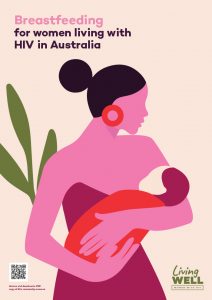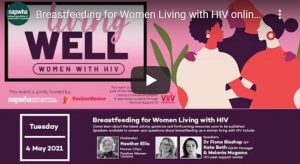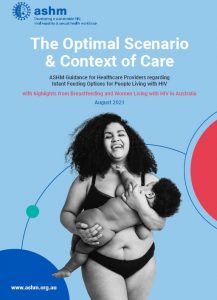Pregnancy and Breastfeeding
*As new resources become available, we will update this page.
PREGNANCY RESOURSES
Women living with HIV can safely experience pregnancy and their baby/babies do not have HIV. In fact, no baby in Australia has contracted HIV from their mother when the mother is on HIV treatment. Many members of Positive Women Victoria have had healthy pregnancies where their babies are HIV negative. And over the years, these members and their children often meet at peer-support social events sharing the journey of their children’s growth from baby to young adult.
‘As a women living with HIV, when I had my first baby, I felt so alone until I met other mothers living with HIV. It has been a joy to meet up occasionally and see our babies grow up,’ Heather E, member of PWV.
To read more about HIV and Pregnancy visit Women Living Well, a resource developed by NAPWHA (National Association of People With HIV Australia).
You can also read updated information on HIV and Pregnancy on the Australian Government webpage managed by Health Direct. (Positive Women Victoria is an information partner of Health Direct)
BREASTFEEDING RESOURCES
Breastfeeding For Women Living With HIV in Australia Resource DOWNLOAD

If you are living with HIV, are pregnant or thinking about becoming pregnant, you may be thinking about breastfeeding your baby, and whether it is safe or advisable.
This resource is the first of its kind in Australia and was developed by NAPWHA (National Association of People With HIV Australia) and Positive Women Victoria in 2021. It is for women who are living with HIV and want to understand the issues around breastfeeding or formula feeding. After reading this resource, we hope you will feel encouraged by the news that although medical and health experts agree that formula feeding is still the safest option, breastfeeding is increasingly being recognised as an option that may be open to some women living with HIV in Australia.
If you’d like a printed copy, we will post it to you. Email: info@positivewomen.org.au or phone: (03) 9863 8747 .
WATCH the Recording – HIV and Breastfeeding for Women Living With HIV – online community forum (4/5/2021)

The Optimal Scenario & Context of Care: Guidance for Healthcare Providers regarding infant feeding options for people living with HIV.
Click on the link to download: FINAL_ASHM HIV Infant feeding Guidance_v4

Published by ASHM in September 2021, this updated guidance for healthcare providers with regard to the infant feeding options available to people living with HIV in Australia offers guidance for a shared decision-making process between a person living with HIV and their healthcare providers to ensure that informed choices are made concerning infant feeding options.
ASHM (Australasian Society for HIV, Viral Hepatitis and Sexual Health Medicine)
In recent years, there has been a growing recognition among healthcare providers, researchers and clinicians that breastfeeding can be a viable choice for people living with HIV if they follow several criteria and are willing to engage in strategies to reduce the risk of HIV transmission.
WATCH THE RECORDING – Breastfeeding Guidance and Resource launched at ASHM Conferences (6-9 September) 2021
INTERNATIONAL RESOURCES ON BREASTFEEDING/CHESTFEEDING FOR WOMEN LIVING WITH HIV
Breastfeeding and HIV: Watch the recording on latest advancing sexual and reproductive rights. WHO updated guidelines released in 2024
Despite scientific evidence in recent years that shows minimal risk (0.3% or less) of HIV transmission from breastfeeding for women living with HIV, they still face many challenges and violations of their rights. A major concern is the lack of clarity, outdated attitudes and conflicting messages surrounding infant feeding practices for mothers with HIV.
Hosted by ICW Global, these issues are discussed by leading HIV and sexual and reproductive rights advocates from around the world in this webinar recording. You will also hear from WHO (World Health Organisation) and the latest policy update on HIV and pregnancy and breastfeeding and details of the updated WHO guidelines to be released in early 2024.
United States Government updates Infant Feeding Guidelines for parents living with HIV (31/1/2023)
The US Government has added updates to the section Infant Feeding for Individuals with HIV in the United States and now asserts the need for shared decision-making between providers and parents living with HIV and increased support from providers for parents’ infant-feeding choices.
The updates include the latest data on HIV and breastfeeding from resource rich countries. In the past, data on HIV transmission via breastfeeding has been from low and middle income countries. This latest data further supports the extremely low risk.
This update to the guidelines from the US outlines: In five small case series that reported on breastfed infants in higher-resource countries, all mothers were on ART and almost all were virally suppressed. A group in Toronto described three breastfed infants with no transmission via breastfeeding.14 Nine women with 10 pregnancies successfully breastfed at one site in the United States,15 and eight women breastfed at a U.S. second site16; there were no cases of HIV transmission. Thirteen women, described in a prospective study conducted in Italy, also had no transmissions of HIV through breastfeeding.17 In Germany, among 30 women with HIV who breastfed, there were no cases of breastfeeding transmission of HIV, although only 25 women had optimal viral suppression. Four of the five women not considered to be optimally suppressed had viral loads of 50 to 70 copies/mL at some point postpartum, and two had had a detectable viral load early in pregnancy and, therefore, did not meet the authors’ criteria for optimal suppression.18 Of note, the approaches to infant prophylaxis ranged from 4 weeks of zidovudine (ZDV) to three-drug ARV regimens using therapeutic doses for the duration of breastfeeding.
READ the updated Infant Feeding for Individuals with HIV in the United States
The Well Project (USA) – Breastfeeding, Chestfeeding and HIV: Supporting Informed Choices
(The Well Project is run by women living with HIV in the US and this page on Breastfeeding contains personal stories (video and text), video presentations, articles, factsheets, scientific reports and resources. The page is updated regularly with all the latest news and events.)
Women and HIV Infant-Feeding Resources Compiled by The Well Project
(This extensive list, which is updated regularly, contains breastfeeding resources from the US and around the world.)
LATEST EVENTS:
ICW-NA (International Community of Women living with HIV – North America) joins forces with 4M – a peer-led program that trains women living with HIV across the UK to become Mentor Mothers. The webinar will feature two physicians who are well-versed on the topic, as well as a number of Mentor Mothers living with HIV discussing and debating all things breast/chestfeeding in the US and the UK.
LATEST RESEARCH – HIV and Breastfeeding Science
Scientific studies from peer-reviewed journals on the risk of HIV transmission through breastmilk. New scientific studies are added regularly. This is part of the HIV and Breastfeeding Defence Toolkit developed by the HIV Justice Network. Read the HIV and Breastfeeding scientific studies
